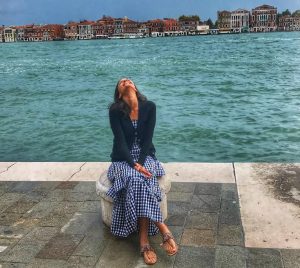Interview with Tishani Doshi
Interview by Mariyam Haider
Poet and dancer, Tishani Doshi’s latest book, Small Days and Nights, released April 2019, narrates the story of Grace (half-Italian, half-Indian), who moves from the US to India, owing to the passing away of her mother. Her life unravels when a house is bequeathed to her, in a village by the sea, and she meets Lucia, a sister, she never knew she had. While Doshi’s last book, Girls are Coming Out Of The Woods, was a poetry collection that evoked feelings of resilience, fear, pain and wonder, her latest novel takes the reader deeper into the realms of familial relationships, loss, endearment and rebirth of emotions that get buried through time and distance.

Tishani Doshi spoke with Mariyam Haider about her latest book, the journey authors make with their characters, and what it means to be a writer in times of shifting identities, displacements and finding stillness through it all. Excerpts from the interview:
In Small Days and Nights, the protagonist, Grace, returns home after spending years away, only to realize that the idea of home was never a place, rather a feeling she had not made peace with, her journey unfolds back from where it started. What is your idea of home?
That idea of home is always a fragile one. People who are born in a place and believe strongly in the idea of birthright are often against the idea of people coming from outside. This idea of the other has always been very strong and potent in human beings, who are inherently territorial. I have always identified in some ways as an outsider and relished observing the behavior of people on the inside. It is an interesting interplay. In the novel, it is on a very particular scale, of a woman who finds herself having to navigate a space that is not really hers. There is no precedent for Grace, who has to find her balance between, new adventures and acclimatizing to a city, she did not grow up in.
You said that you feel an outsider in particular places, do feel that way about India as well.
I think of no other place than India as home, but it is such a large country, you can journey from Delhi to Madras, nobody speaks Hindi and you feel like you have landed in another country.
It is not rare to feel like an outsider in your own home. Likewise, you can experience a sense of belonging outside of home too.
Perhaps in a foreign city even without understanding the language, you could feel a connection with a person. It restores your faith in interconnectedness and in what humans can offer to each other. I think that question of belonging is very fluid and is always changing.
That is precisely the beauty of being human. Being able to observe, look at things from both outside and inside, and find the connecting threads. Then there are those distinctions that make us unique in our own way.
Yes. In fact, there are certain moments in the novel, where Grace is in the city with her friends, and still feels lonely in their company. She is disappointed, as she tries so hard to get rid of that feeling. In that moment I recollected Rilke’s words, who is a favorite poet. In his Letters To A Young Poet, he talks about how important it is for writers to befriend their solitude; how sometimes we tend to feel lonelier even when we are surrounded by people. I think we have all experienced that to some degree. Sometimes the companionship we seek, in reality does not match our expectations and we are left disappointed.
As a performing artist, you take poetry and dance to produce a piece that is etched in the memory of your audience and readers. How different is the process of performance from the process of writing?
It is interesting. I started writing well before I began dancing. These two things have moved in parallel tracks, with conversation between them. Their coexistence is recent, it is interesting to work with one form, a poem, from which you create a completely separate thing, and yet it remains the poem.
Poetry is very elastic and allows different expressions. I want to do a lot more of it.
I start with the image, a line and then explore which poems are open enough or can lend themselves to reinterpretation. I do not want to let go this experience live interaction between an artist and an audience, since it is so powerful. The idea of theatre helps us suspend belief, despite technology you think, oh my god, on a stage, a single person with a single spotlight can do simple things, offer a story or a poem, and it moves you. I am i interested in that power.
Do your poems often end up surprising yourself?
My poems constantly surprise me. Writing has always been a way of resolving inexplicable mysteries. I cannot explain where a poem comes from, a first line or the story. Except through the act of writing, I arrive at an idea from my thoughts. Therefore, many times, I begin a poem at a point, but it moves and ends up where it confirms my intentions, in retrospect.
The poem is like a connector from the first point to the second and sometimes it maybe to fifth or eighth, And you realize these little synapses are similar to looking into your brain and trying to imagine what’s going on in there, it’s very hard to do. Through the very act of writing, certain things become evident and that is the wonder of it. The impulse is never to start with an agenda, Multitude things layer within the body and mind, they express themselves in different ways, and the poem has that transformative power.
Did you experience that element of surprise while you were writing Grace’s story in Small Days and Nights?
It changed a lot as I was writing it. When I started, I did not realize that I wanted to emphasize the feeling of unsettlement and tension as much. The journey truly began at a place of beauty, the idea of this beautiful landscape, this place. In fiction though, it is good to play up drama and tension. I spent a lot of time there by myself to experience excessive solitude and understand its effects. The nature of fear can be in a woman’s mind, particularly when she is alone. You get a little paranoid sometimes and the fear is very real. All these things factored more and more into the story as it progressed, the Characters got morally ambiguous, even the teacher, who is identifiably a good character. There is a strong undercurrent of ambiguity pulsing through the novel. It did not start that way, but when you write something over years, the work is reflective of the changes within you that happens over time.

Grief plays a major role in Grace’s life, her relationship with her mother, her sister, and grief brings out immense vulnerability. How much of a personal process did it become, to write about grief for characters that are almost autobiographical?
Grace is not autobiographical but a vessel for a lot of my ideas and thoughts. The story itself has inputs from my experiences.
The question of grief is interesting as it is tied to vulnerability. We are told the right way is to stay strong, the paradox is that if you are very resilient and unemotional, you are unable to experience grief properly because you are blocking it.
I believe you should embrace your vulnerability, be open, and let life in. It would be a sad way of being in the world. Experience the beauty while acknowledging that there are dangers.
The process of grief never truly stops. When grief enters your life, rather than trying to banish it, accept it and know that it is still possible to see beauty and joy. The idea of love and grief, beauty and darkness exists dichotomously. That is the human conundrum and to allow it in is the way to be, but everybody has to find their own balance.
You are active on Instagram, keeping your followers engaged, allowing them to follow your progress on your writing and performances. As an artist how useful, do you find social media?
I spent many years off social media. It coincided with the time when I started to live in Paramankeni, in this isolated village. It was a strange coincidence, I moved there partly to get away from things; I wanted to immerse myself in writing, thought and reading. I just cut off, physically and virtually and it increased the sense of isolation. At some point I thought, let me just get back onto some social media, if it is horrible, I will switch off. Instead, I discovered it changed in five years; there was a way to create a community. This was great, because it removed the need for writers and artists to be located at the capital be well known and have your work recognized. With technology you could be anywhere, living your life, and you work is still reachable. It is a wonderful way to meet readers, other writers, and to present your work.
The one issue I have with social media is that it takes up a lot of time and designed to be addictive, you have to resist that. It interrupts your energy.
I like the ability to be in the middle of nowhere and to be able to connect with people. I have had some wonderful things come out of it, so I would advise to proceed with caution; to be well aware that the real work comes from a different place.
What is your writing routine between working towards a manuscript deadline versus writing as a discipline and part of everyday life?
I work best in the morning, if I manage 4-5 hours; I get the best out of my day in terms of writing. There are obviously optimal situations for writing; a quiet room works best for me. It helps to create a ritual around it. Everybody has their little fetishes and rituals. I try to keep it simple.
Travel is the only thing in my life that is directly in conflict with writing. I find myself in a nomadic mode quite frequently and it is difficult to have that discipline, stamina and ritual when you are moving because you are not in your space and there are too many variables. The exciting thing about travel is that ideas flow and I am inspired to go back to do the writing. I make sure I make time to write and to be still.
From the time when you studied creative writing, to being published and now teaching creative writing, what would be your three main points of advice for emerging artists?
The first one is to read. Read widely, deeply, and curiously. It is interesting to discover that so many people feel the need to share their story, they strongly feel that they have something to say that the world needs to know, but do not think it important to read anything else. This is essentially elementary. These are the tools of the trade: you need to develop the ear, the tongue, develop the eye, develop all the senses to understand what makes a sentence work, what makes a poem work.
The second is, open up to different forms. Go to museums, go to dance performances, watch films, do things that do not come necessarily into your line of work. The idea is to understand that this is all about making connections.
Lastly and quite importantly, discipline. Nothing happens without discipline and stamina. There are no quick ways to doing things. I emphasize the importance of perseverance to my students and you have to make time, to devote to writing. Structure your life such that you can find the energy to do what you want to do.
This interview has been edited for length and clarity.
![]()

Mariyam Haider is a writer and poet, based in Singapore. She is the researcher of the book The Billionaire Raj: A Journey Through India’s New Gilded Age written by James Crabtree. Her writing has appeared in Hindustan Times, Livemint, Feminism In India, New Asian Writing, Kitaab, and Asian Review of Books. A journalist by training, Mariyam holds a Masters in Public Policy, from the National University of Singapore. She tweets @mariyamraza and her work can be read on mariyamrazahaider.com.



